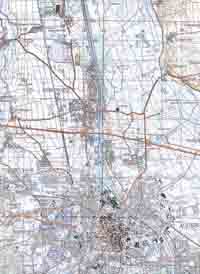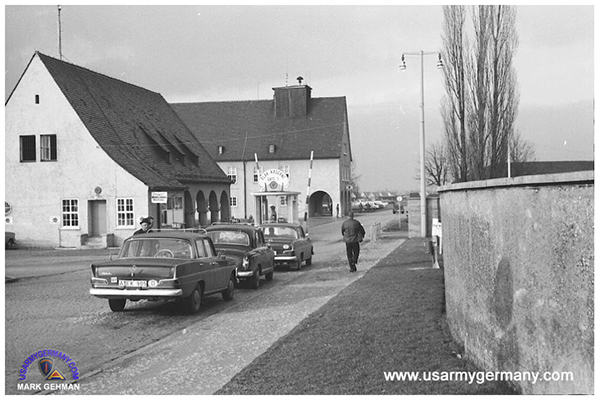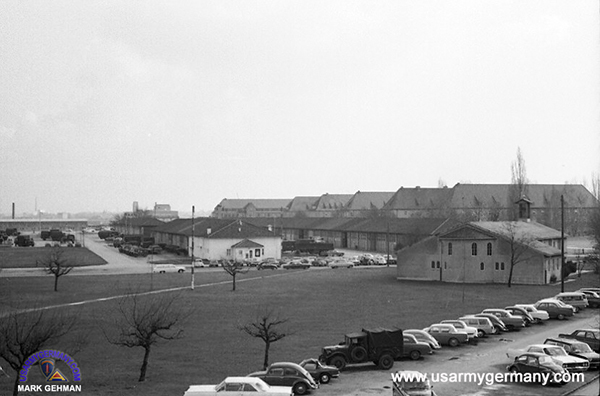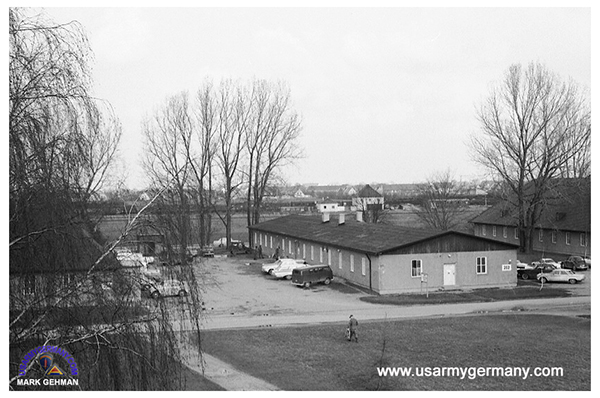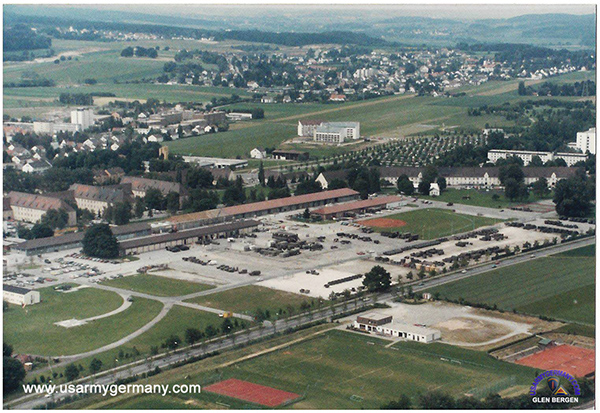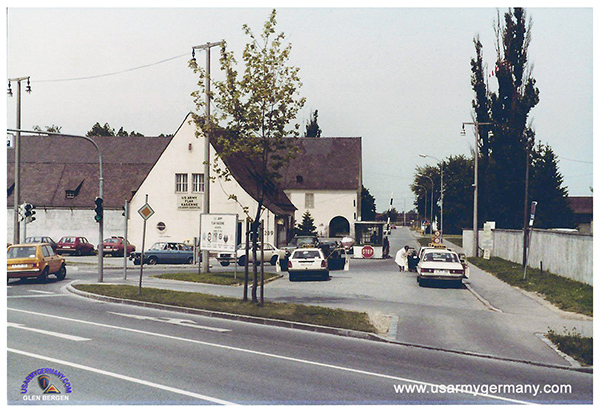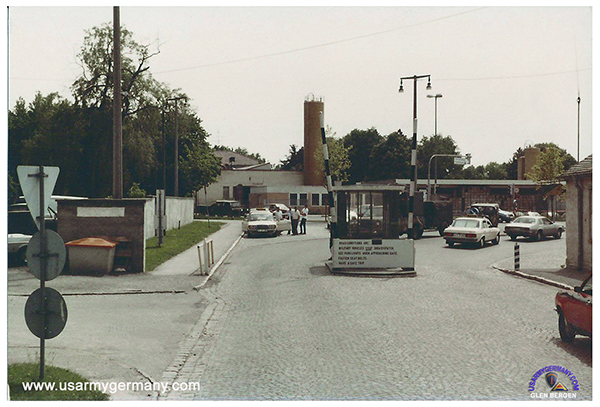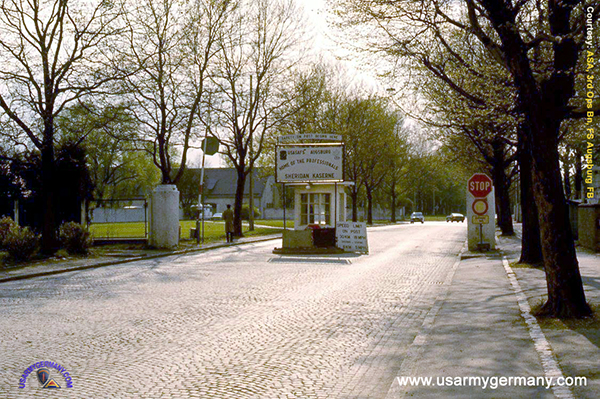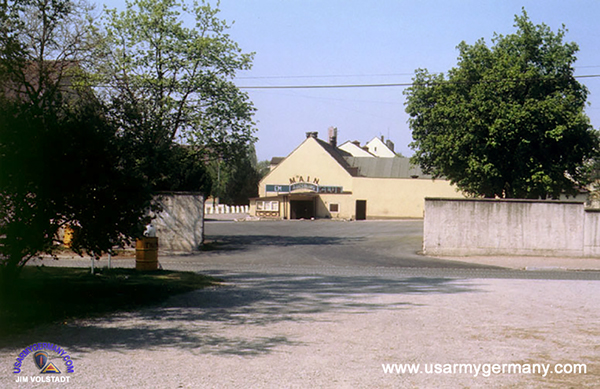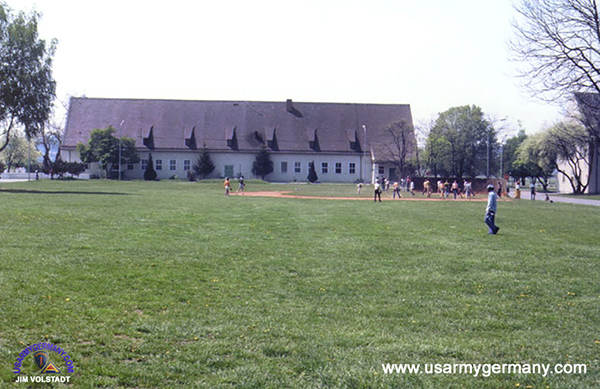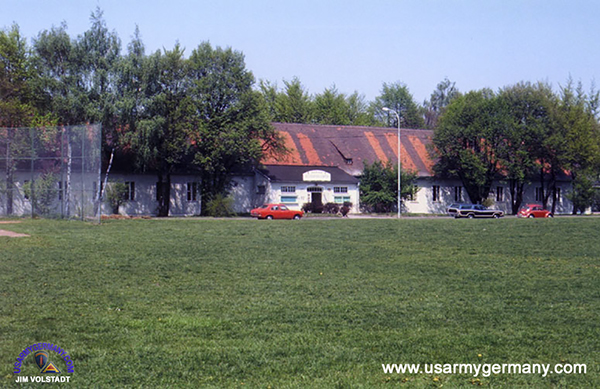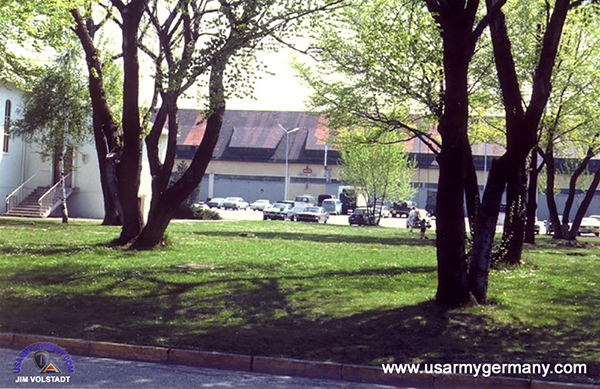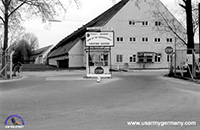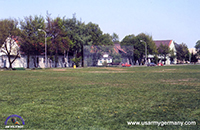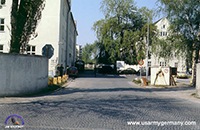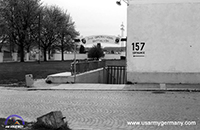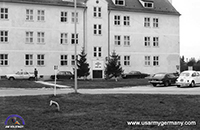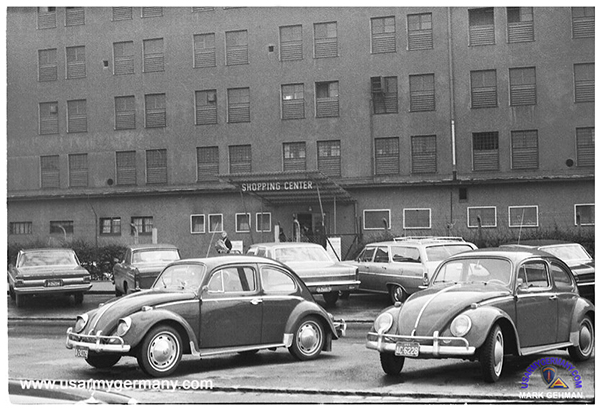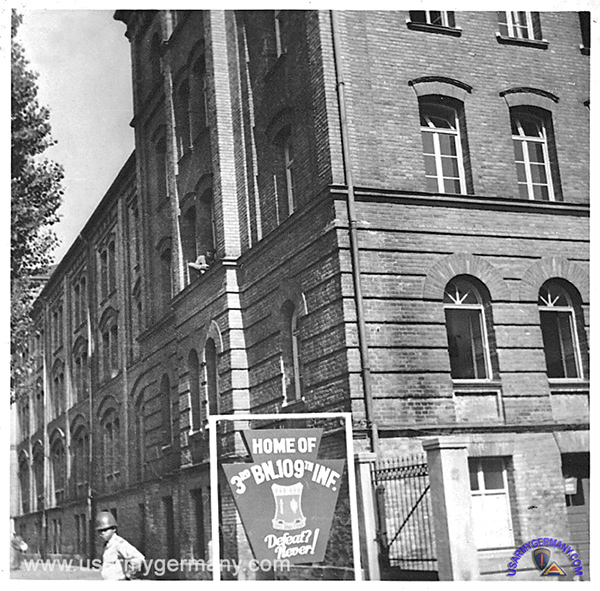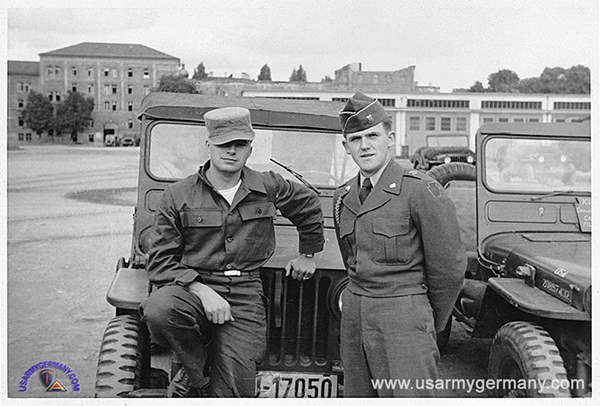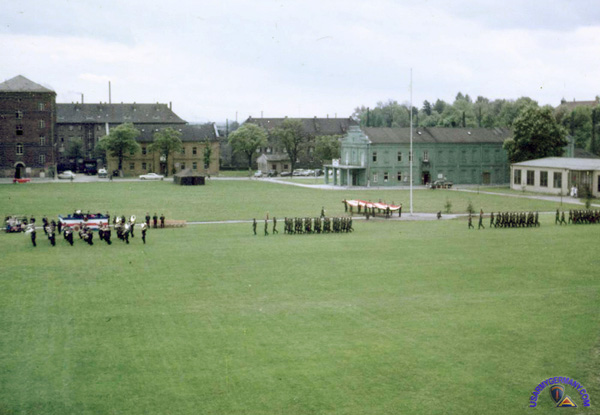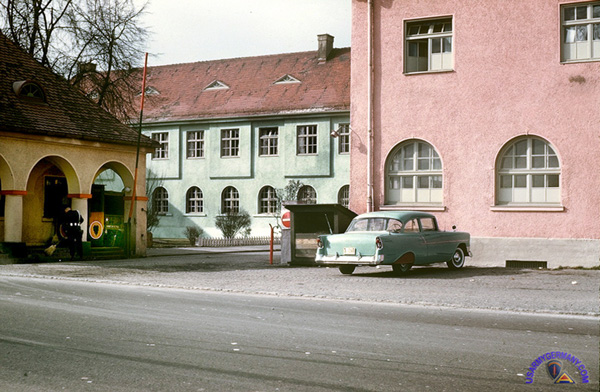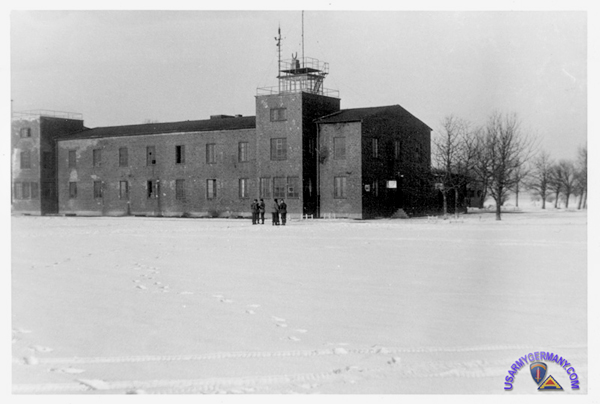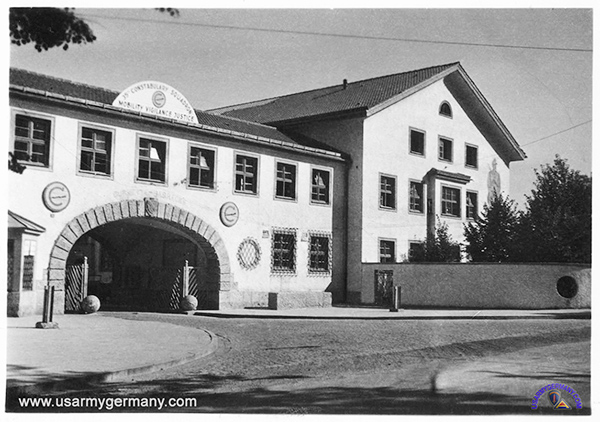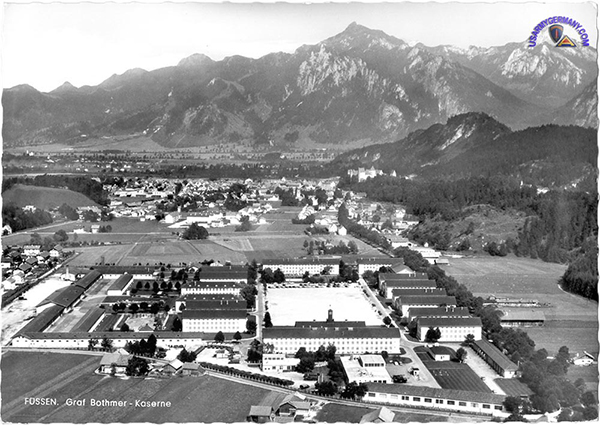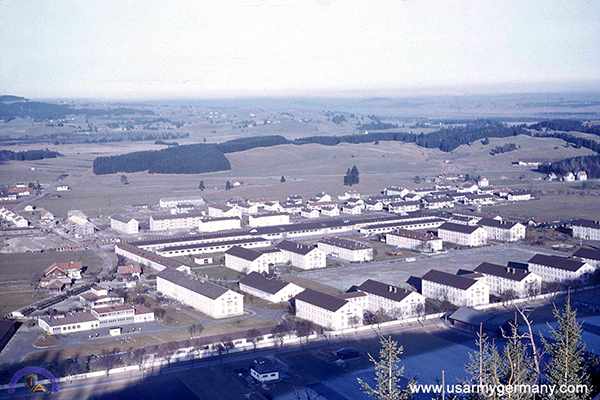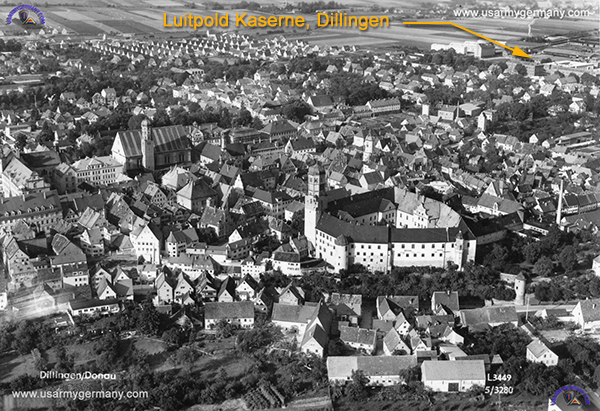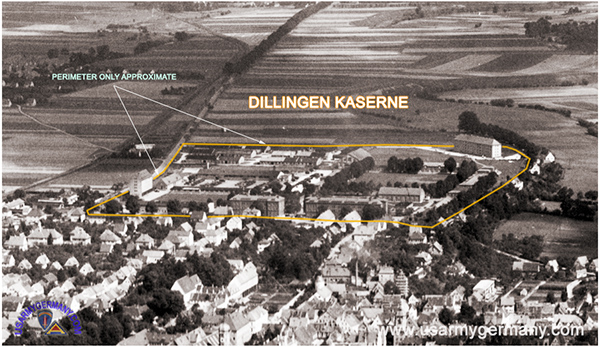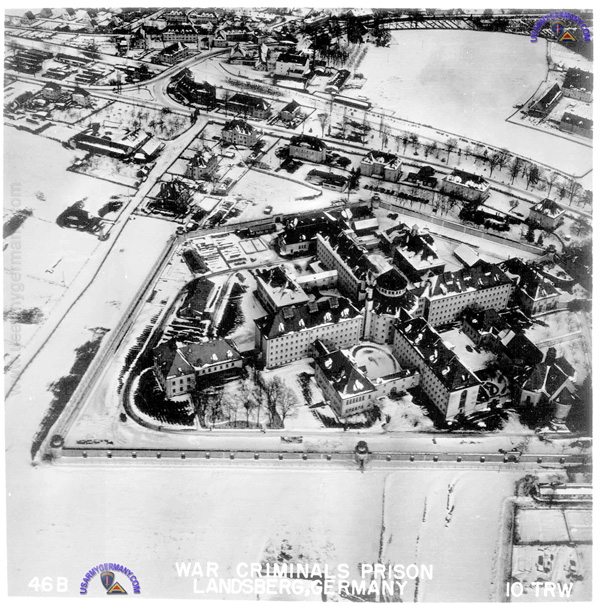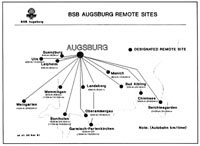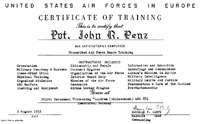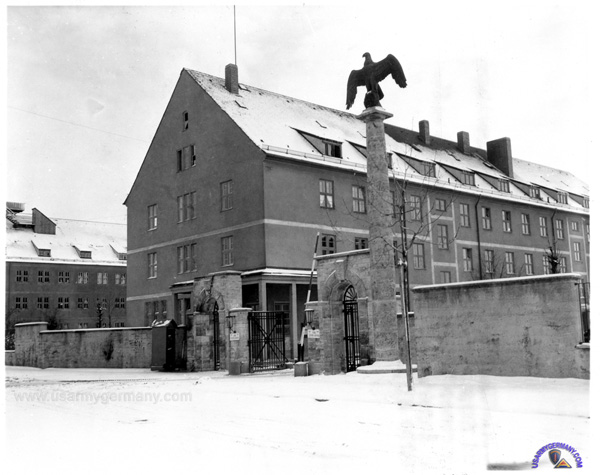Click here to open 'USArmyGermany' frameset
ARTILLERY KASERNE |
||
AUGSBURG MISC. |
||
For additions, corrections, or suggestions please contact the webmaster
|
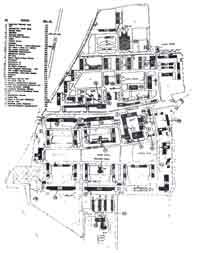 1. Sheridan Kaserne, late 1970s |
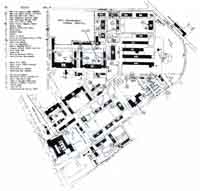 2. Reese Barracks, late 1970s |
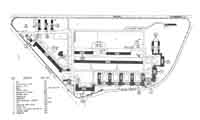 3. Flak Kaserne, late 1970s annotated |
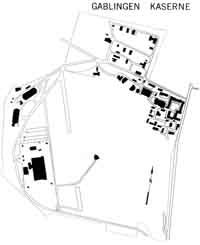 4. Gablingen Kaserne, late 1970s |
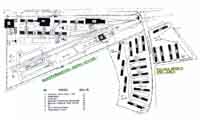 5. Quartermaster Supply Center, late 1970s |
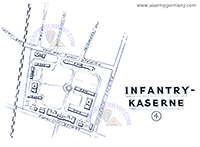 6. Infantry Kaserne, 1950s |
| 1978 Topographical map of Augsburg and vicinity. Map was compiled and published in November 1978 by the 585th Engineer Company, 649th Engr Bn (Topo)(Army). Map was based on map series M735, sheets L7530 & L7730. Click on the thumbnail to view a larger format of the same map. Click here for a list of the installations. |
 |
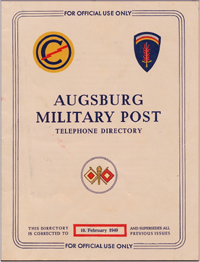 1. Augsburg Telephone Directory, 10 Nov 1949 |
|
|
|
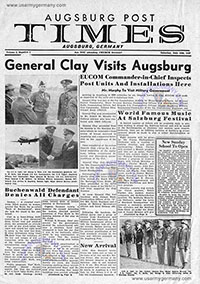 1. Augsburg Post Times - June 19 1947 (PDF) |
|
|
|
||||
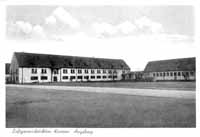 A. Luftgaunachrichten Kaserne, Augsburg |
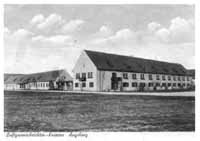 B. Luftgaunachrichten Kaserne, Augsburg |
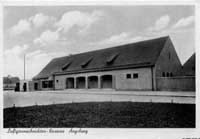 C. Luftgaunachrichten Kaserne, Augsburg |
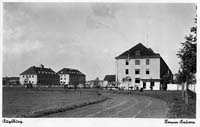 D. Somme Kaserne, Augsburg |
|
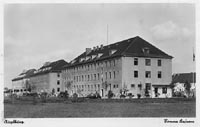 E. Somme Kaserne, Augsburg |
|
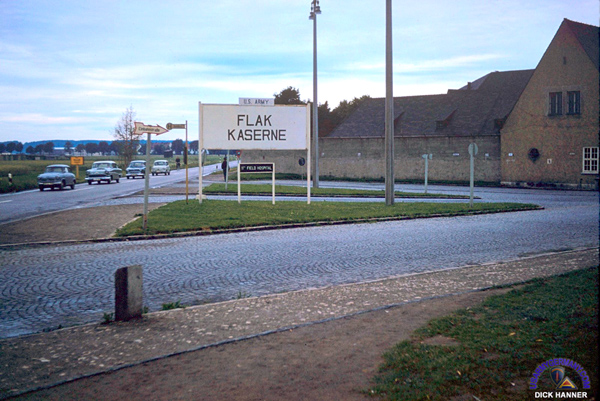 Sign in front of Flak Kaserne, Augsburg (Dick Hanner) |
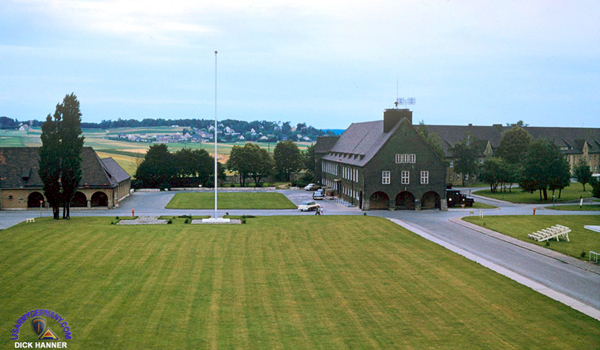 Bldg #207 (on the right), Flak Kaserne, Augsburg (Dick Hanner) |
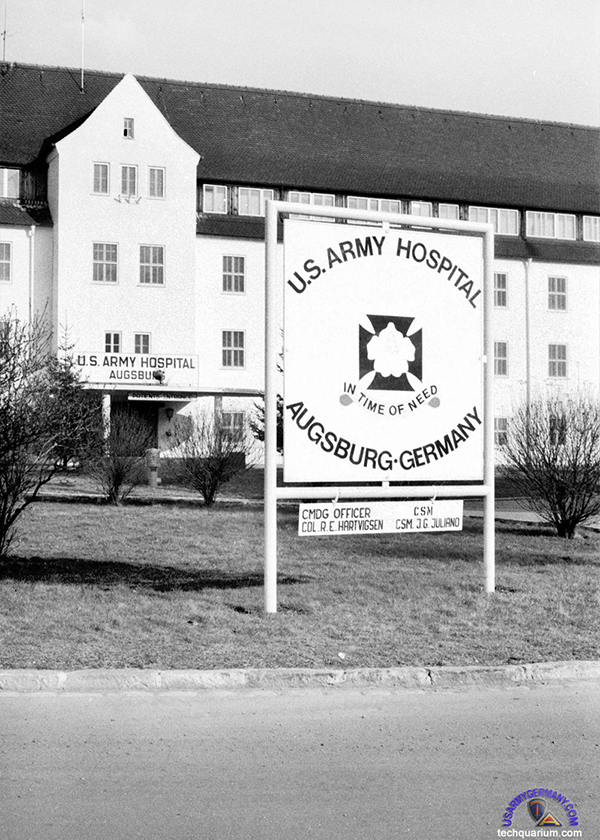 US Army Hospital, Flak Kaserne, Augsburg, 1970s |
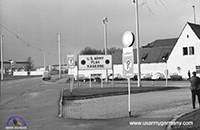 1. Neusäßer Str. |
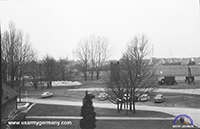 2. Bldg #206 |
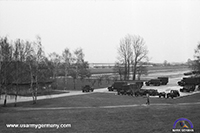 3. Bldg #203 |
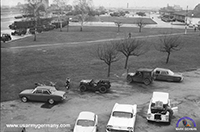 4. Parking lot in front of Bldg #207 |
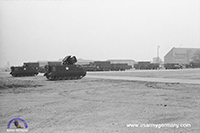 5. Track park |
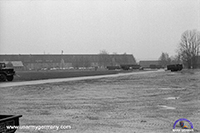 5. Bldg #207 in background |
||
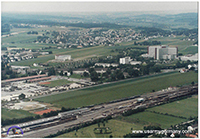 6. Flak Kaserne, 1982 |
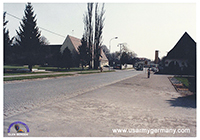 7. Flak Kaserne, 1982 |
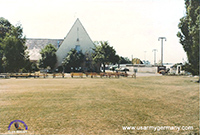 8. Bldg #210, 1982 |
||
|
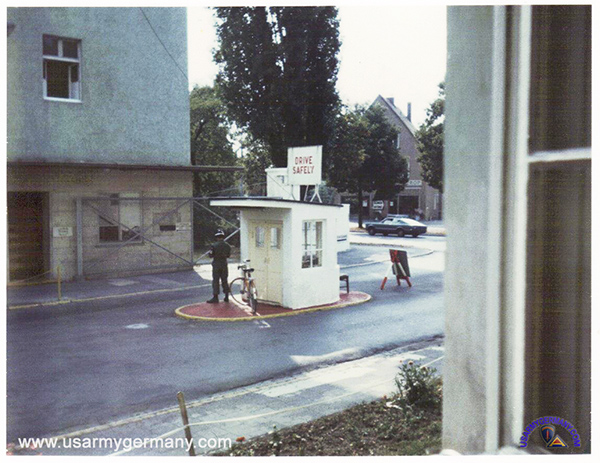 Gate on Langemarck Strasse, Reese Kaserne, Augsburg (Jim Sewell) |
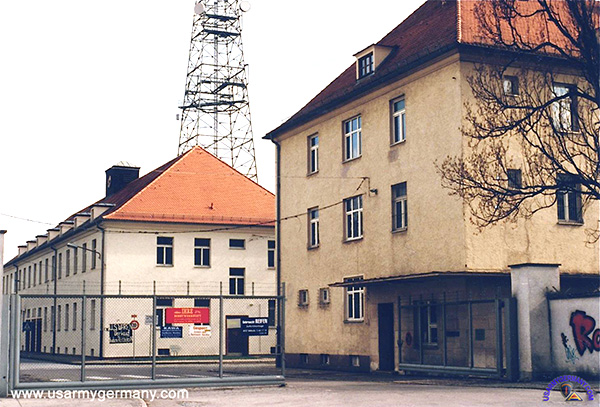 Reese Kaserne, Augsburg, 1997 (Max Lohrmann) |
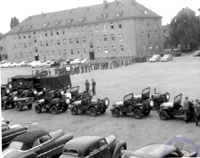 1. Ready for maneuvers, Reese Bks, Sept 1958 |
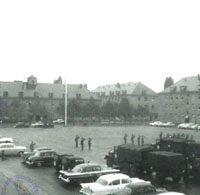 2. Conducting retreat, Reese Bks, Sept 1958 |
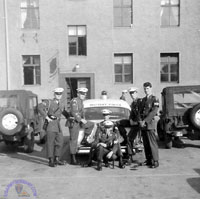 3. Prior to guard mount, Reese Bks, 1958-60 |
|
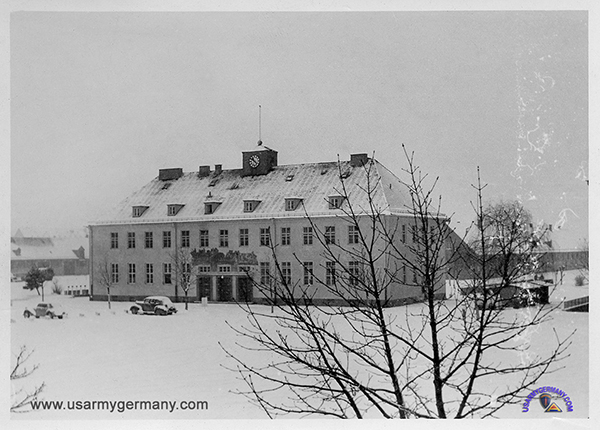 Aerial view of Sheridan Kaserne, Augsburg, 2007 |
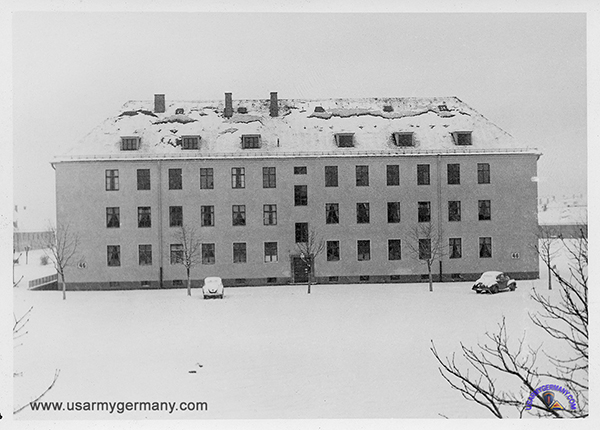 Front Gate (Grasiger Weg), Sheridan Kaserne, Augsburg (ASA, 3rd Ops, FS Augsburg) |
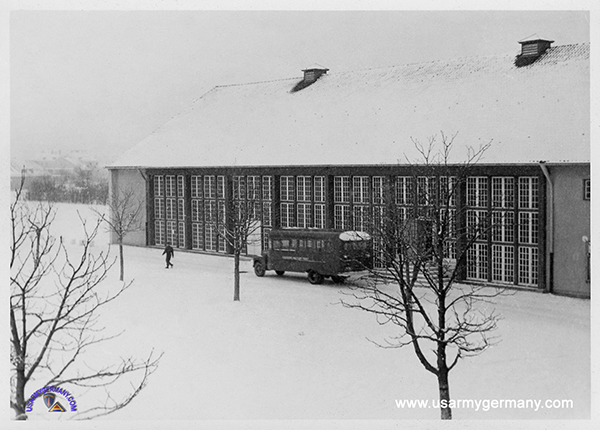 Front Gate (Grasiger Weg), Sheridan Kaserne, Augsburg (ASA, 3rd Ops, FS Augsburg) |
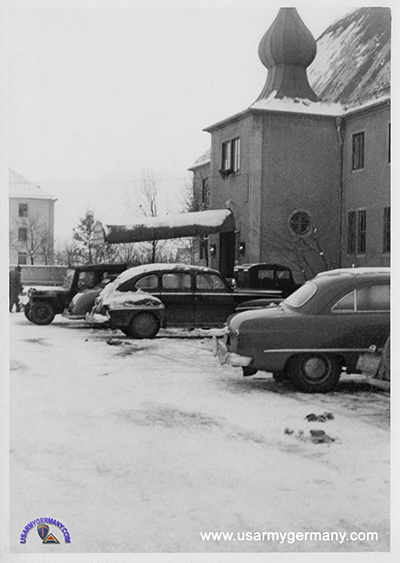 Front Gate (Grasiger Weg), Sheridan Kaserne, Augsburg (ASA, 3rd Ops, FS Augsburg) |
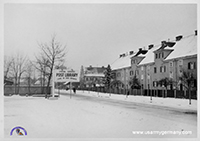 4. Ready for maneuvers, Reese Bks, Sept 1958 |
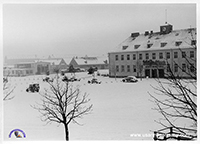 5. Conducting retreat, Reese Bks, Sept 1958 |
|||
|
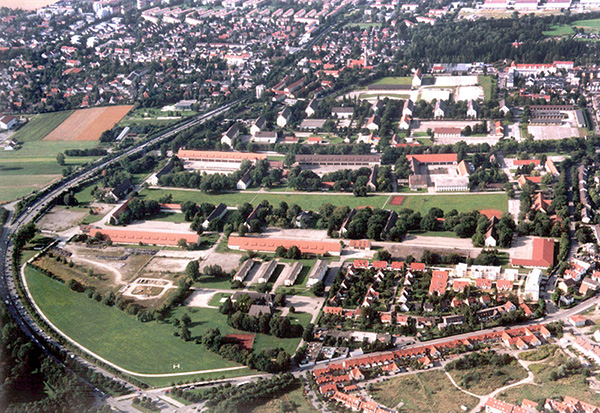 Aerial view of Sheridan Kaserne, Augsburg, 2007 |
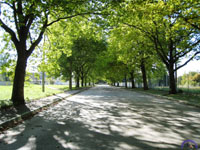 1. Access road |
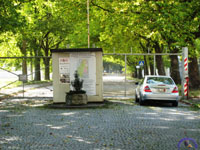 2. Construction gate |
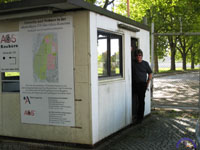 3. Gate shack with map |
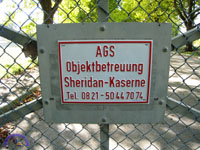 4. AGS sign on gate |
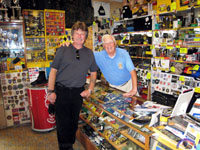 5. Army store near Sheridan |
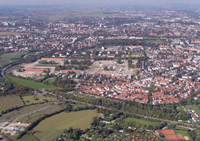 6. Aerial of Sheridan Ksn construction site |
Photo #6 and some detailed construction pics and maps are available on the Sheridan Park website (content is in German). Check out all three sections - "Wohnungsbau", "Gewerbe" and "Park und Infrastruktur". | |
|
|||||||||||||||||
|
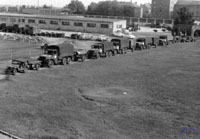 1. Motor pool area, Infantry Ksn, Augsburg, 1960-62 |
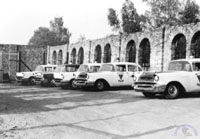 2. Co C, 508th MP Bn motor pool, Infantry Ksn, 1960-62 |
|
||
|
|
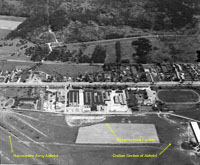 1. Haunstetten Airfield (KB) |
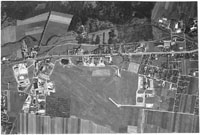 2. Haunstetten (KB) |
|||
|
||||
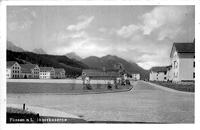 A. Jäger Kaserne, Füssen |
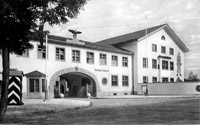 B. Jäger Kaserne, Füssen |
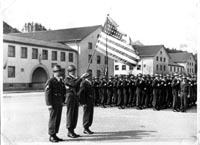 1. 70th FA Bn, 1949 |
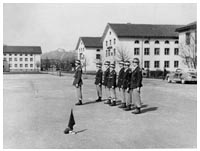 2. 70th FA Bn, 1949 |
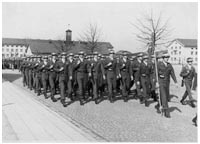 3. 70th FA Bn, 1949 |
||
|
|
||||
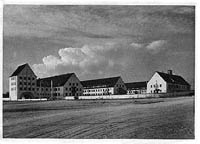 A. Scharnhorst Kaserne, Kempten |
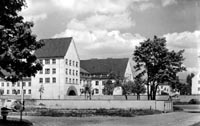 B. Scharnhorst Kaserne, Kempten |
|||
|
|
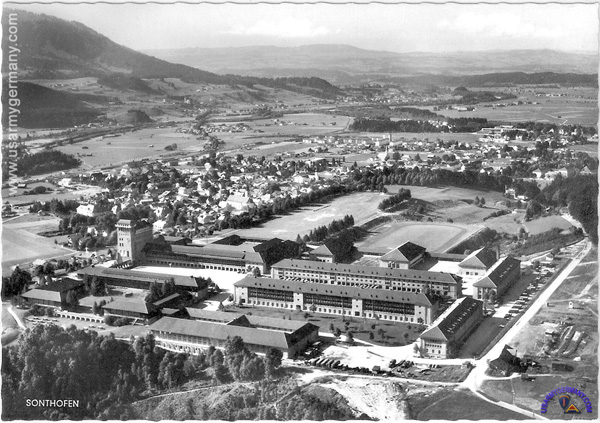 Burg Kaserne, Sonthofen, 1960s (German postcard) |
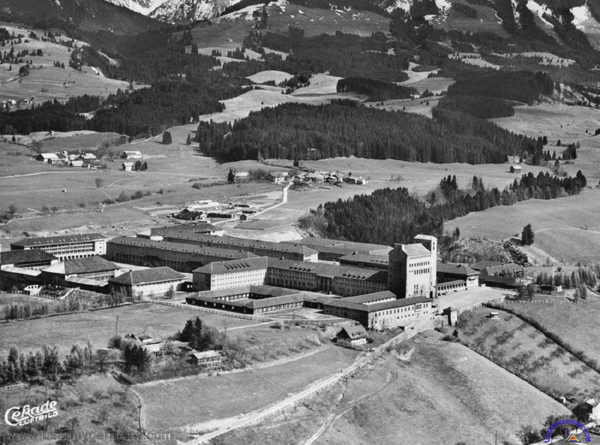 Burg Kaserne, mid to late 1950s (Germany postcard) |
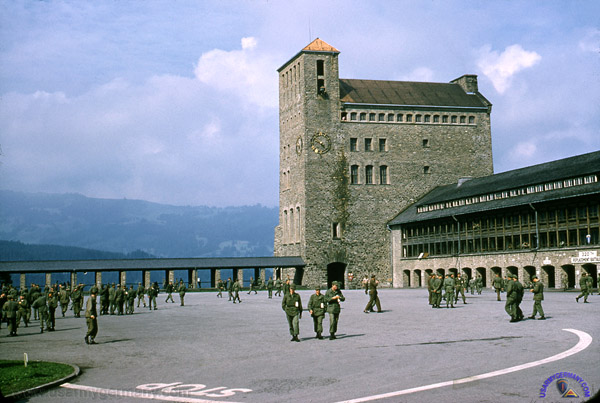 Burg Kaserne, serving as a replacement depot, early 1950s (Webmaster's collection) |
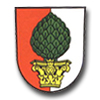
Augsburg is located in the southern part of Bavaria, approximately 68 kilometers west of Munich. Community Commander for Ansbach was the Commander, VII Corps Artillery. In 1975, Augsburg Military Community consisted of installations in and around the city of Augsburg with several remote sites. Geographic Locations identified as part of Augsburg MILCOM in USAREUR Reg 10-20, 14 Dec 1978 (1):
(1) The list of remote sites associated with Augsburg MILCOM in the 1978 Reg was incomplete. One of the known missings sites: Marxheim river training area. There were probably others. Additional information and details would be appreciated! Contact the webmaster. On 1 October 1991, under the Community Command Plan, USMCA Augsburg was reorganized and redesignated as the 236th Base Support Battalion and attached to the concurrently activated 99th Area Support Group in Nuernberg. |
Commander views Augsburg's future. Col Alan Fox, Senior Tactical Commander, 236th BSB As a result of significant changes in troop population levels, population centers, and reduced funds available for base operation support, USAREUR now has established 10 ASGs which will perform the primary functions and services that the 40 separate Military Communities performed before. By the way, you will also have to learn a whole new set of acronyms ASGstands for Area Support Group. Each ASG has one or more subordinate units called Base Support Battalions, or BSBs. The BSBs are usually located in each of the former military communities and provide the direct services to the soldiers, civilians and family members of that community and any remote sites within the battalion's area of responsibility. Augsburg is now serviced by the 236th BSB (Augsburg) which is part of the recently activated 99th ASG in Nuernberg. Other BSBs within the 99th ASG are located in Ansbach, Bamberg and Nuernberg. Who's who in Augsburg? The 236th BSB, commanded by Lt. Col. Stephen Daly, has realigned the community staff along traditional military staffing lines. For example, instead of a DPCA (Director of Personnel and Community Activities) we now have a S-1. Instead of DPTMS, we now have a BSB S-2/S-3. Instead of a DOL, we now have a S-4. DEH remains as DEH. The 236th BSB has a total staff of 47 military and 492 civilian personnel, and has assumed responsibility for 14 remote sites. Also of note to yours truly, there are no longer community commanders anywhere in Germany. Most of the officers still remain, they have however a new name and redefinition of their duties and responsibilites. I am now the Augsburg Senior Tactical Commander (STC). I have less to do with the routine, daily administration and functioning of the community than I did in the past. My primary duty of overseeing the quality of life, general well-being and operation of the communty remains clearly the first interest of the STC. The BSB commander runs the staff and the community, but he does so with the interest of the command clearly in mind. (Source: New Augsburg Scene, April 1992) Commander welcomes remote site residents to the Augsburg community family Col Alan Fox, Senior Tactical Commander, 236th BSB You may not know it, but there are more than 4000 "Augsburgers" out there who do not live in Augsburg! These are the military service members, civilians and retirees who reside within the Greater Augsburg Base Support Battalion area in locations appropriately known as Remote Sites. Let me tell you a little about these folks and their homes as we welcome them into the Augsburg fold. |
|
|
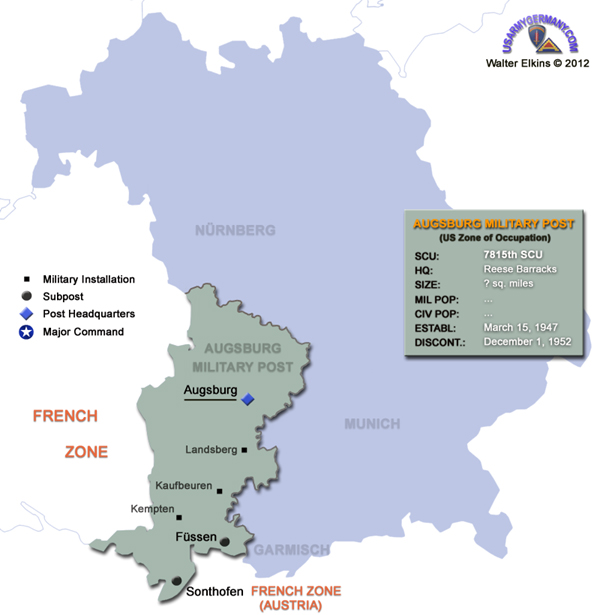
Map of Augsburg Military Post (Walter Elkins)
| Augsburg Military Post (March 1947 - December 1952) | |
| (Source: STARS & STRIPES, Feb 19 1950) | |
|
|
| (Source: STARS & STRIPES, July 8, 1951) | |
| Neu-Ulm Subpost The new Neu-Ulm Subpost will be activated soon. The subpost's first commander will be Lt Col William H. Seitz, Jr. (former S-1 of the Augsburg Military Post). Five kasernes in Ulm and Neu Ulm will be renovated. They are: All of the above properties (with the exception of Boelcke Kaserne) were used previously by IRO and are now under US Army control. Boelcke previously housed German industry. |
|
I was a US dependent in Germany from Nov 1946-May 1951. I was about to be drafted but had the choice of Army enlistment for 3 years or Air Force for 4 years. Basic Training for both was at Sonthofen (each separately of course). I had several friends that enlisted in the Army and took their BMT at Sonthofen as well. I have thus far been unable to find any Documentation on Sonthofen being utilized as a Basic Military Training site. |
|
Anyone that would like to contact me check my website: http://www.geocities.com/betbil.geo/page39.html
The 115th Sta Hosp originally operated a 750-bed station hospital in England until the end of the war in Europe. In May 1945, the personnel and equipment were moved to the European Continent and subsequently (August) moved to Augsburg with orders to set up a 750-bed station hospital as part of the Occupation Army. The 115th took over the General Kneussl Kaserne (a.k.a. Neue Infanteriekaserne - later to become part of Sheridan Kaserne), a former Wehrmacht kaserne (constructed in 1936) that had been used by Seventh US Army as its headquarters immediately after V-E Day. The 15-acre, 14-building installation had to be repaired and converted to a hospital plant before the 115th could receive its first patients (November 1945). The hospital downsized quickly as troops redeployed to the States in the months following V-E Day. Eventually it operated as a 150-bed station hospital. By mid-1947 (date of the report) the facilities of the hospital had been consolidated so it could operate with a minimum of personnel. Treatment of patients was confined to two of the buildings which housed all wards, clinics, and out-patient services. All the messes (enlisted personnel; patients; officers and nurses; civilian personnel) had been moved into one building. Quarters for all Medical Department personnel were located within the kaserne with the exception of those for male officers who occupied requisitioned quarters near the hospital. |
Related Links: Field Station Augsburg - Arne Mahlum's wonderful and comprehensive website dedicated to the veterans of ASA and INSCOM stationed in Augsburg. And there's much more on other units located in Augsburg from 1945 to closure in 1998. You have to check this one out! Broken Link! US Army in Augsburg - a web site created for patch collectors and people interested in the now-closed Augsburg Military Community. Broken Link! |
 |
Amerika in Augsburg e.V. |
||
|---|---|---|---|
